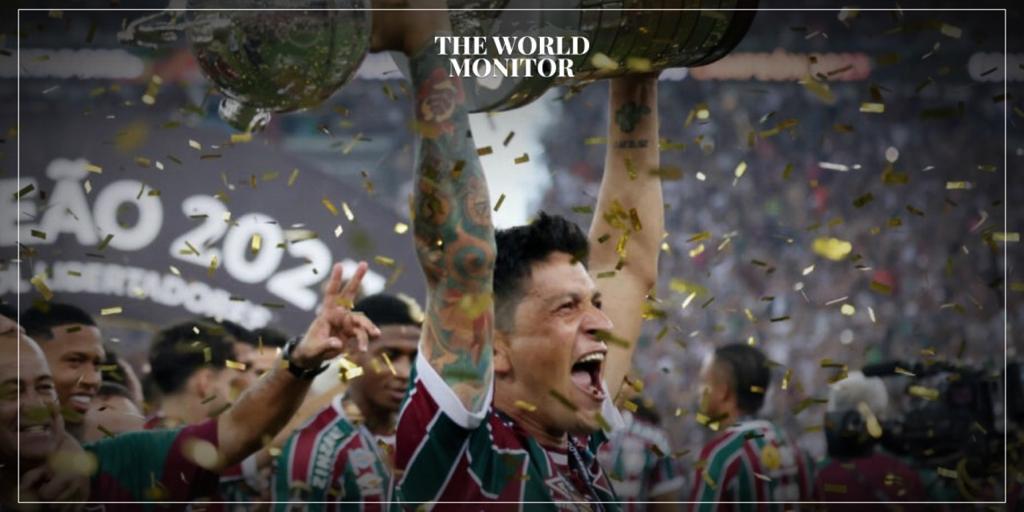In a thrilling Saturday evening showdown at Rio de Janeiro’s iconic Maracanã Stadium, Brazil’s Fluminense secured their first-ever Copa Libertadores trophy. They bested Argentina’s Boca Juniors with a dramatic 2-1 victory, concluding in extra time after a 1-1 deadlock at the end of regulation play.
Argentinian forward Germán Cano and Brazilian young star John Kennedy were the heroes for Fluminense. Cano opened the scoring in the 36th minute. Then, in the 99th minute, Kennedy found the back of the net, solidifying Fluminense’s historic win. Boca Juniors’ sole response came from Peruvian Luis Advíncula, who scored in the 72nd minute.
The match reached a boiling point as both sides saw red. Kennedy received his second yellow card, leading to his ejection in the 102nd minute. This was after he celebrated his goal with the crowd, a move that is against the regulations. Shortly afterward, Boca’s Colombian defender Frank Fabra was sent off in the game’s dying minutes. The offense was a violent strike to Fluminense captain Nino’s face.
Fluminense’s victory extends Brazil’s dominance in South America’s premier club competition. This marks the fifth consecutive year a Brazilian team has won the title. This feat has been unmatched by any other country in the tournament’s 64-year history.
With this triumph, Fluminense has secured a spot in the upcoming FIFA Club World Cup. The tournament is set to take place in Saudi Arabia this December. It offers another chance for the Brazilian side to claim global glory.
On the other side, Boca Juniors have faced heartbreak in recent Copa Libertadores finals. Most notably, they were defeated by their fierce rivals River Plate in 2018. That match was controversially relocated to Madrid’s Santiago Bernabéu Stadium. The decision was made after fan violence marred the fixtures in Buenos Aires.
The Copa Libertadores, known for its intense matches and passionate fanbase, is South America’s equivalent to UEFA’s Champions League. It has been a battleground for some of the most memorable moments in club football since its inception in 1960.
Fluminense’s victory is a testament to Brazilian football’s strength and depth. Brazilian clubs have been showing consistent performances on the continental stage. The win also reflects the competitive nature of the Copa Libertadores. Here, historically dominant teams like Boca Juniors are challenged by emergent forces.
For Fluminense, a club with a rich history dating back to its founding in 1902, the victory in Copa Libertadores marks a pinnacle in their storied legacy. It is a club that has produced several notable players who have shone both domestically and internationally.
The Boca Juniors defeat adds to the narrative of their storied rivalry with River Plate. Their loss in the 2018 final was a bitter pill to swallow, especially given the extraordinary circumstances that took the game to Europe.
Fluminense’s path to the final was not easy. They faced formidable opponents and showed resilience and tactical prowess throughout the competition. Their squad, a blend of experienced players like Cano and promising talents like Kennedy, exemplifies the club’s commitment to a dynamic and forward-thinking football philosophy.
As the celebrations continue for Fluminense, their sights will now set on the Club World Cup. It is an opportunity to build on their success and showcase the quality of South American club football on a global stage.
For Boca Juniors, the loss is a call to reflection and an impetus for coming back stronger. The storied Argentine club will look to the future, aiming to reclaim its place at the pinnacle of South American football.
The Copa Libertadores will continue to fascinate football fans worldwide. It is a tournament that brings together a continent’s passion, talent, and spirit of competition, producing heroes and stories that resonate far beyond the confines of the pitch.






